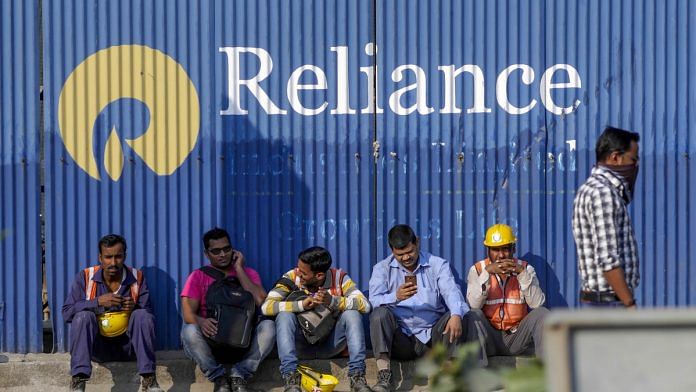New Delhi: The Narendra Modi government’s proposed decision to remove anti-dumping duty on the import of a chemical that is widely used in textile production has been welcomed by textile producers, but is likely to adversely impact domestic producers of the chemical, primarily Reliance Industries Limited.
Finance Minister Nirmala Sitharaman, in her Budget speech, proposed the revocation of the duty on purified terephthalic acid (PTA), which is imported from countries like China, Iran, Indonesia, Malaysia, Taiwan, South Korea and Thailand. Two notifications dated July 2016 and July 2019 are proposed to be revoked.
The acid — a petrochemical — is used in the production of polyester, including polyester fibre and food beverage containers.
Reliance is among the top five PTA producers in the world, with a capacity of 5 MMTPA (million metric tonnes per annum), a majority of which is produced in India.
Reliance’s website points out that PTA is the preferred raw material for polyester, which is used in items like clothing, furniture, upholstery, containers and films, and added that it is one of the largest suppliers of PTA to domestic manufacturers.
ThePrint reached the Reliance Industries spokesperson through phone call and text message, but there was no response until the time of publishing this report.
Also read: Modi govt plans big incentives to attract foreign manufacturers from Tesla to Glaxo
Impact on textile industry
Government sources said the issue was flagged by the textile industry to the Prime Minister in a meeting in the last week of December. Industry representatives explained to Modi the negative effects of the high anti-dumping duty on PTA.
The anti-dumping duty on PTA varies from $27 to $160 per metric tonne, depending on the country of import, making domestic industry uncompetitive in the global market.
Asked the rationale behind the removal of this duty, Finance Minister Nirmala Sitharaman said at a press conference Sunday it has been a long-pending demand of the industry.
“That particular product is a raw material in many of the industries. There has been persistent demand that they should be allowed to source that particular product at an affordable rate, even if it means importing it,” Sitharaman said.
“When many industries are dependent on imported raw materials, and we are allowing so many of the others, why not allow this also?”
The removal of the anti-dumping duty is likely to impact profit margins of domestic producers of PTA, such as Reliance, as it will force them to cut prices to be competitive.
‘Welcome move’
S. Gurumurthy, chartered accountant and part-time member of the Reserve Bank of India board, welcomed the government’s move on Twitter.
Gurumurthy wrote about how the $160 per metric tonne anti-dumping duty on PTA gave “monopoly and super profits to Reliance for 20 years”.
He added that the textile industry had fought this duty in the Supreme Court and the Competition Commission of India.
Modi govt budget has ended $160/mt antidumping duty on PTA which gave monopoly & super profits to Reliance for 20 years.Textile industry fought this duty relentlessly for 2 decades at including competition commission & SC but failed. Now 20 year injustice been removed. Hats off
— S Gurumurthy (@sgurumurthy) February 2, 2020
Speaking to ThePrint, K. Selvaraju, secretary general of the Southern India Mills’ Association, said the removal of the duty is a big relief for the textile industry. He added that there was a shortage of domestic availability of PTA often, affecting capacity utilisation of the polyester manufacturing facilities.
“There are very few PTA manufacturers in the country. Why should a duty be imposed to protect a few firms?” Selvaraju asked, adding the removal of the duty will play a crucial role in increasing the size of the textile industry to $350 billion by 2025, as envisaged by the government.
Also read: Truth be told, Modi’s budget won’t solve India’s economic crisis






